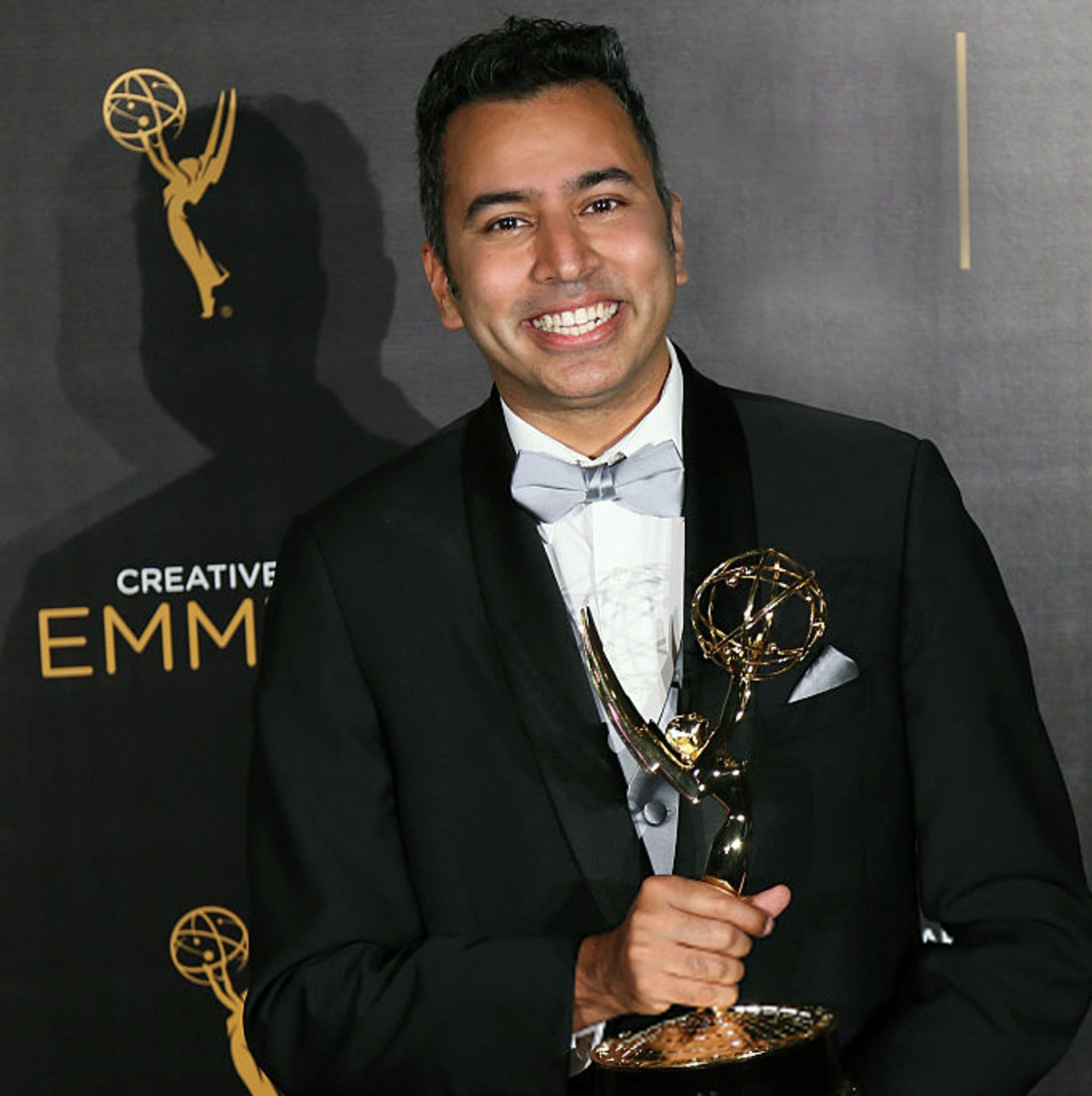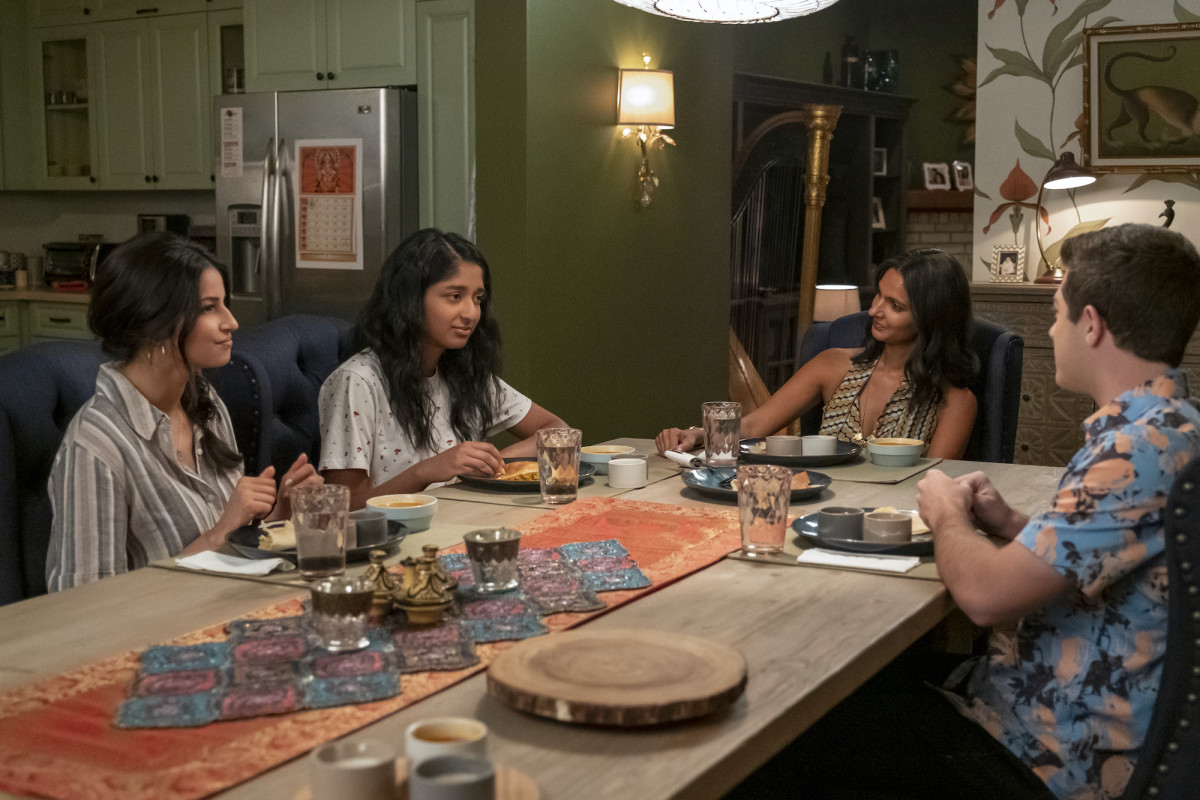For Script Magazine: Susan Kouguell interviews Kabir Akhtar, director of “Never Have I Ever,” sharing his experiences working with Mindy Kaling and helping to tell the story of a first generation Indian American teenager, a story he relates to personally.
Click to tweet this interview to your friends and followers!
From our respective homes, on opposite coasts of the country, Kabir Akhtar and I social-distanced, to chat by phone to discuss his work as an Emmy award-winning director-editor and his current project on the hit Netflix series Never Have I Ever.

Kabir Akhtar’s Career Trajectory – From Editor to Producer and Director
Kabir Akhtar, ACE is an Emmy-winning director-editor whose work includes The Academy Awards, Arrested Development, Crazy Ex-Girlfriend, BH 90210, and Unsolved Mysteries. A three-time Emmy nominee, Kabir won the award in 2016 for editing the pilot of Crazy Ex-Girlfriend, becoming the first person of color to win in the category.
He earned additional Emmy nominations for his work on Billy Crystal’s most recent opening film for the Oscars, and on Arrested Development; he was the first person to be nominated for comedy editing on any streaming platform. Kabir has also been nominated twice at the ACE Eddie Awards. He has edited ten pilots which were greenlit to series, and has directed the pilot episodes of two series: 8th & Ocean for MTV, and the relaunched edition of Unsolved Mysteries. Kabir has served as Co-Chair of the Asian-American Committee at the DGA, and as a Peer Group Executive Committee member at the Television Academy. He has been a featured speaker at many industry events and festivals, including SXSW.
Kabir worked on all 62 episodes of Crazy Ex-Girlfriend, rising from editor to director/producer by the time the series ended. Kabir directed 12 episodes of TV last year, including the season finales of the critically acclaimed series Grown-ish and High School Musical: The Musical: The Series. His work in 2020 includes episodes of the Unicorn for CBS in addition to Never Have I Ever.
With a special passion for musical projects, Kabir has directed 30 music videos with a combined 13 million YouTube views, as well as comedy segments of the Academy Awards and the Primetime Emmy Awards.
Kabir Akhtar shares his experiences working with Mindy Kaling and helping to tell the story of a first generation Indian American teenager, a story he relates to personally.
Kouguell: How did you get involved with “Never Have I Ever”?
Akhtar: Knowing this story so well as a first generation kid, I knew I would love to be involved with it. I think a lot of times when you’re trying to get connected to a project it’s so difficult, but this was a case where I told my reps and they waved their magic wand, and the next thing I knew… it happened. Having the opportunity to be part of the team is extremely rewarding.
Kouguell: What was most exciting for you about this project?
Akhtar Working with Mindy Kaling. And telling a story about a first generation brown teenager—I know that story very well. I had never seen that on television anywhere, certainly not when I was growing up. I can definitely relate to that story.
Kouguell: Did you work with Mindy Kaling before?
Akhtar: I didn’t know Mindy before Never Have I Ever but I had seen her work.
Mindy Kaling was great to work with. Very supportive, very cool, and genuine. We worked together mostly in prep, and had discussions with Lang Fisher, co-creator of the show. It was awesome to work with them.
Kouguell: Let’s talk about Indian-American representation, on and behind the camera.
Akhtar: Growing up in the 1980s there were never brown people on TV except the people with heavy accents or the nutty next door neighbor, which eventually gave way to brown people playing terrorists. The opportunity of telling the story of a fully realized high schooler, searching for her own identity and to do so in a fun way, was very important to me.
There are very few South Asian American directors in town. Most of us know each other. I thought it would be fun to start an award show for brown people, (laughs) but the same four people would be nominated every year. Seriously, the pool is expanding now, which is great.
Kouguell: Being a first generation American myself, who is now decades away from living the horrors of being in high school, I found there was a universality that I could relate to in this series.
Akhtar: I’m blown away by the response to the show and the ability of making a show about these themes. Ultimately we were all in high school, and it is very relatable.

“Never Have I Ever” Episodes 5 and 6
Akhtar: The two episodes I directed are numbers 5 and 6. They’re a little unusual for the series since they cover basically the same period of time, Normal episodes focus on Devi, the main character, but Episode 6 revisits the same time period as Episode 5 from a different character’s point of view, with a different visual style and different narrator, and so on. It was very fun to design those episodes to fit together.
About Episodes 5 and 6
…started a nuclear war (Season 1, Episode 5)
Devi allows rumors about her and Paxton to swirl during an overnight school trip. Fabiola opens up to Eleanor, who gets upsetting news about her mother.
…been the loneliest boy in the world (Season 1, Episode 6)
With absentee parents, a shallow girlfriend and no one to hang out with, Ben Gross is lonelier than ever, until an unlikely invitation offers some hope.
(This is the one from Ben’s perspective, narrated by Andy Samberg.)
Kouguell: Although these two episodes take place at the same time but from two different character’s points of view, you incorporated a unique visual style for these episodes to fit together, yet stand apart.
Akhtar: That type of parallel storytelling I love and I got lucky to work on that structure again. When I edited season 4 of Arrested Development, there was something similar with each episode following a character through the same time period; I was the supervising editor of that season, and it was my job to make sure the pieces fit together in a way that felt real.
In Never Have I Ever it was fun to construct that world, and have nods from one episode to the other. In Episode 6, the Ben episode, the moment Ben sees Davi talking to Paxton down the hall, it was a connection they had in Episode 5. When we were discussing shooting it, it was important to see physical action that was easily understood as happening at the same time, like when Ben sees them far away, the same jacket, and how he looked at the same moment in time.
Seeing the same moments from different POVs. at the end of Episode 5 with the kids coming back from the Model UN field trip, we’re following Davi, and the bus pulls over and she has a flashback and she gets a text on her phone. And in Episode 6, we see that same moment and there’s no flashback ambulance, we just see Ben watching her. The moment is so important to her story, but Ben doesn’t have context to know what’s she’s going through. It was fun to play with all that on set.
Kouguell: Did you collaborate with the writers of these episodes?
Akhtar: I worked very closely with the writers of the episodes. They understand where every detail fits in very well, and I make sure we communicate. The whole process is very collaborative.
The Film School Question
Kouguell: Did you go to film school?
Akhtar: I went to Penn undergrad and University of Miami Film School.
Kouguell: I’m a professor at two different film programs, and many students ask me—without being ironic and fully sincere—if I think film school is worth it. I believe there’s no one-size-fits-all answer; I think it depends on the type of projects you want to make, your creative sensibilities, finances, and so much more. Your thoughts?
Akhtar: Agreed. It depends on what you get out of film school. The first job I had in L.A. came through a connection with my then roommate from film school. We were business partners for a long time and as freelancers we were able to hire each other and that was a big part of my career success.
Final Words
Kouguell: Your advice to aspiring filmmakers?
Akhtar: You have to be persistent. Over ten years ago, I was editing cable reality shows, bad cable reality shows—and fast forward X number of years, and I am an Emmy-winning TV director. That doesn’t happen overnight. You have to remember that careers take a long time to develop and nurture. I talk to a lot of film school classes, and I see who is really passionate about their work and career, and I tell them, it is hard. Be persistent and don’t give up.